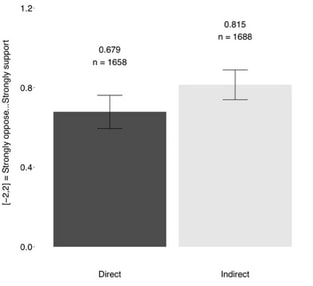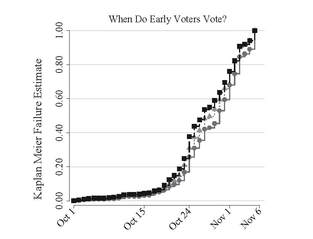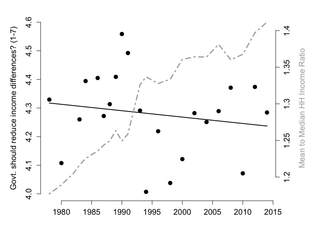With a sharp rise in economic inequality in the last 40 years, why has there been no parallel rise in support for redistribution in the United States? Research addressing this puzzle has been quick to note that these competing trends invalidate a seminal model in political economy advanced by Meltzer and Richard (1981). While voters appear to be acting against their self-interest, my research shows this isn't the case. Voters want redistribution, but they have trouble believing that government spending is going to result in more money in their pockets.
I find that beliefs about the political process, whereby tax revenues are spent, outweigh citizens' self-interested motivations when forming preferences for redistribution. My work identifies citizens' specific concerns about government as the "redistributor" and examines whether policies can be designed to overcome their skepticism.
I find that beliefs about the political process, whereby tax revenues are spent, outweigh citizens' self-interested motivations when forming preferences for redistribution. My work identifies citizens' specific concerns about government as the "redistributor" and examines whether policies can be designed to overcome their skepticism.
Published Research

Do Means of Program Delivery and Distributional Consequences Affect Policy Support?
Experimental Evidence about the Sources of Citizens’ Policy Opinions
Vivekinan Ashok and Gregory Huber.
2019. Political Behavior.
Associated Monkey Cage Post
Experimental Evidence about the Sources of Citizens’ Policy Opinions
Vivekinan Ashok and Gregory Huber.
2019. Political Behavior.
Associated Monkey Cage Post

The Dynamic Election: Patterns of Early Voting Across Time, State, Party, and Age
Vivekinan Ashok, Daniel Feder, Mary McGrath, and Eitan Hersh.
2016. Election Law Journal 15(2): 115–128.
Coverage: Washington Post
Vivekinan Ashok, Daniel Feder, Mary McGrath, and Eitan Hersh.
2016. Election Law Journal 15(2): 115–128.
Coverage: Washington Post

Support for Redistribution in an Age of Rising Inequality:
New Stylized Facts and Some Tentative Explanations
Vivekinan Ashok, Ilyana Kuziemko, and Ebonya Washington.
Spring 2015. Brookings Papers on Economic Activity.
Coverage: NYT, Economist, Wall Street Journal, NYT Op-ed, Brookings
New Stylized Facts and Some Tentative Explanations
Vivekinan Ashok, Ilyana Kuziemko, and Ebonya Washington.
Spring 2015. Brookings Papers on Economic Activity.
Coverage: NYT, Economist, Wall Street Journal, NYT Op-ed, Brookings
Working Papers
- Identifying the Role of Self-interest when Investigating Redistributive Preferences (Revise & Resubmit, British Journal of Political Science)
- Conceptualizing Citizen Perceptions of Government Waste, Fraud, and Abuse. (Email for draft)
Selected Works in Progress
- Do campaigns respond to changes in economic inequality?
- Equity Considerations and Mass Support for Corporate Income Tax Policy (with Nikhar Gaikwad)
- Analyzing Survey Experiments with Ordinal Outcome Data (with Natália S. Bueno)
- Measuring recognition of government (social) programs (with Gregory Huber)
- Does learning about the ‘bundle’ of government benefits increase demand for government activity? (with Gregory Huber)